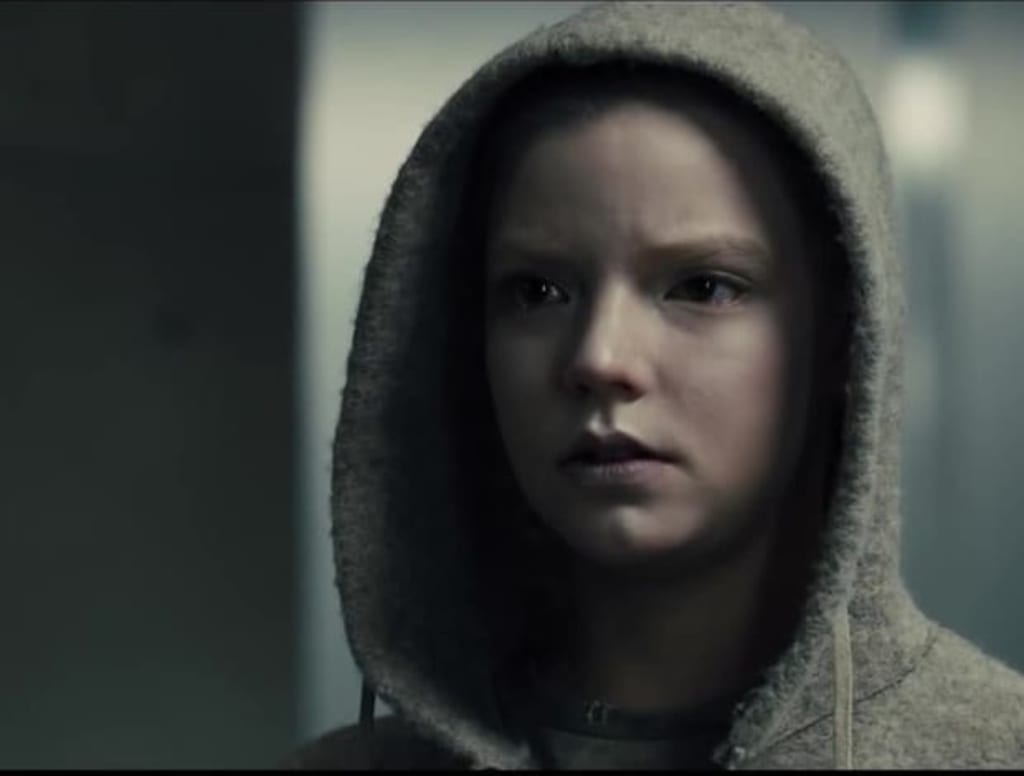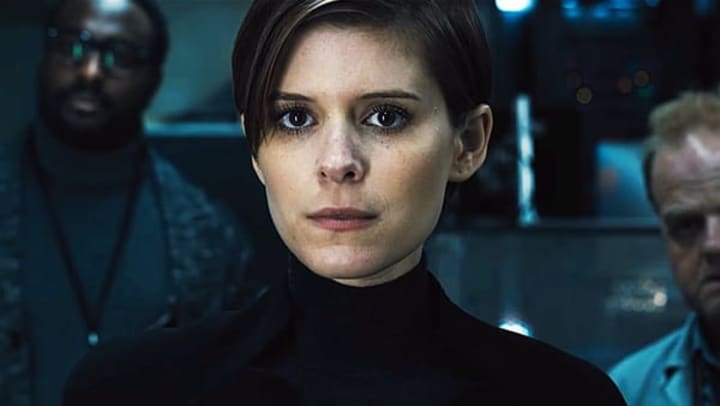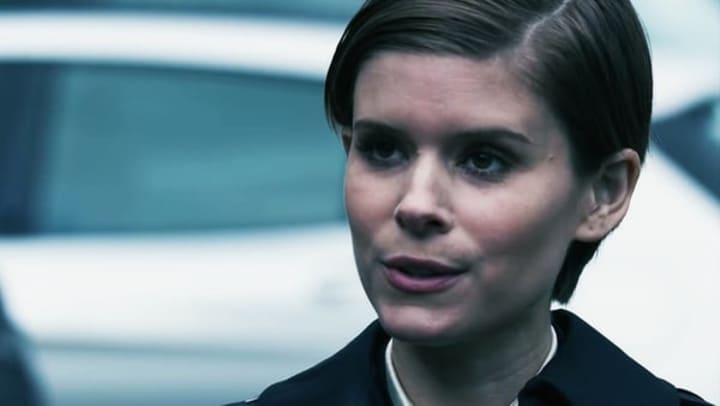
Science-fiction has always been a vehicle to explore the deepest, darkest questions of philosophy. The best science-fiction writers use the genre to hold up a mirror to our society, leading us to question our place in the world; that's why science-fiction is a transformative genre, with a tremendous amount of power. Morgan, released on September 2nd, is no different; the film explores some fascinating philosophical questions, and its climax leaves us with some very disturbing answers...
Warning: Spoilers follow!
The film stars Anya-Taylor Joy in her second major role, following critical acclaim in The Witch (there are reports that she's also been approached to play the part of the superhero Magik in Fox's New Mutants). In the world of Morgan, scientists have long been using genetic engineering to create lethal living weapons; Morgan's designers sought to prove that an "emotionally complex" version of these weapons was viable, and introduced human emotion into the mix. The result is a dramatic conflict between Morgan's emotional responses and her deepest innate impulses to kill and attack.
In contrast, Kate Mara plays the part of a woman known as Lee Weathers. Lee, too, is a genetically engineered weapon; she's an earlier model, one not designed to deal with emotional complexity, one sent in with a strict termination order should Morgan get out of hand. The conflict between the two warriors is fascinating and illuminating, pushing both characters to their limits, and confronting Lee Weathers with a world of emotions she wasn't built to understand.
What's the Philosophical Question?

Kate Mara's Lee Weathers. Image: Fox
Although neither Morgan nor Lee are human — there are tantalizing hints that Morgan in particular possesses psychic powers, but these are never developed in the film — both characters raise intriguing questions about humanity. One of the greatest philosophical questions is also one of the simplest: can a person transcend their own nature? Can a greedy person ever change and stop being greedy; can a violent person conquer their desire for violence; can a cheating spouse learn to be faithful? Can a recovering alcoholic ever truly be said to have recovered, or will they always be vulnerable to potential addiction?
As you can see from these examples, the question may be philosophical, but it's also hauntingly personal. It's a question that runs through so many human relationships, and — at one time or another — will prove important for every one of us. Can we transcend our nature?
What Is Morgan's Answer?

An intriguing and symbolic scene. Image: Fox
Morgan gives a pessimistic answer. The scientists who created Morgan are deluding themselves; by introducing emotional complexity into a genetically engineered weapon, they've just added an instability. The film presents a downwards spiral of violence; from an attack, to a murder, to a breakout and rampage. Created as a living weapon, Morgan is simply incapable of dealing with the emotions she's subjected to. When pushed, she defaults to violence, and there's a flashback that suggests she instinctively sees weakness as something to be exploited. This is simply hardwired into her nature.
The experience of Lee Weathers is equally interesting. The scientists don't know that she, too, is a weapon; they think she's just a representative of Risk Management. As a result, she's confronted with an emotional world she too was never created for. Boyd Holdbrook's character, Skip, even makes a pass at her! At the film's climax, the feud between Lee and Morgan has become personal. It's telling that Lee is still armed with a rifle when she chooses to sneak behind Morgan and drown her; she chooses brutal hand-to-hand combat rather than a long-range sniper shot. By this point, the weapon's effectiveness has been compromised by emotion; it's telling that she then kills the rest of the scientists. Just like Morgan, this 'living weapon' was never designed to deal with emotions.
In a disturbing end-scene, we see Lee sat in a cafe, playing with her hands in exactly the same way Morgan did just before launching her rampage. Although her corporate masters are confident she's proved herself, it's clear that as a 'living weapon', Lee is just as unstable as Morgan — and the inevitable result will be bloody.
The Scientific Implications

Image: Fox
Genetic engineering is a subject of much discussion in the present day. In February, the UK's Human Fertilisation and Embryology Authority (HFEA) gave scientists in London permission to edit human embryos. Their focus is purely on understand the process of embryonic development, and no experimental embryo will be brought to full term. Last year, Chinese scientists tweaked the genes of 28 embryos in order to try and prevent a blood disorder. We're not yet on the road to designer babies - where scientists shape the DNA of an embryo in order to align it to their parents' (or the state's) will - but there are real ethical concerns that we're headed there.
At its best, science-fiction acts as a cautionary tale, warning us of the direction that science could take. An extension of 'designer baby' #technology was used in the film to create Morgan, and — most likely — to create Lee Weathers as well. Unwittingly, the scientists involved in this have created subhumans who are incapable of dealing with the complexity of their emotional experiences.

That smile was a surprise! Image: Fox
This is all science-fiction, but it's also a cautionary tale. We're nowhere near the science of designer babies, but the ethical concerns surrounding that idea are very real indeed; sooner or later, scientists involved in the field would make a mistake, with horrific results. In 2015, a UNESCO panel of experts called for an outright ban on genetic editing. From a scientific perspective, the panel feared that the risks would be far greater than simply releasing a killer who has to be stopped. They observed:
“Gene therapy could be a watershed in the history of medicine and genome editing is unquestionably one of the most promising undertakings of science for the sake of all humankind..."[However] this development seems to require particular precautions and raises serious concerns, especially if the editing of the human genome should be applied to the germline and therefore introduce hereditary modifications, which could be transmitted to future generations."
In other words, the panel's concern wasn't that we could see the creation of Morgan and Lee Weathers. Their concern is that even the most well-intentioned experiments risk introducing "hereditary modifications" that could be absorbed into the future of our race's DNA. Scientists are only just beginning to understand how DNA works, and the risk of introducing a developmental instability into our race seems very high indeed.
All in all, Morgan is an intriguing film. It toys with some fascinating philosophical and scientific concepts, although I have to confess that it doesn't always seem aware of the issues its dealing with. Still, the movie continues science-fiction's grand tradition of facing some of the more intriguing issues that we face as a species, and I'll always applaud that.
About the Creator
Tom Bacon
A prolific writer and film fan, Tom has a deep love of the superhero genre.






Comments
There are no comments for this story
Be the first to respond and start the conversation.